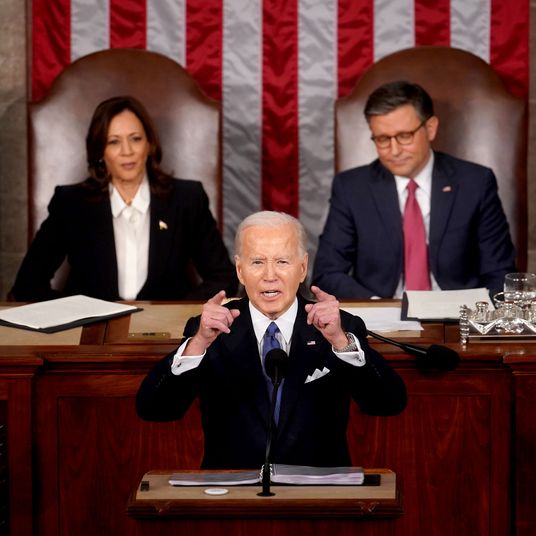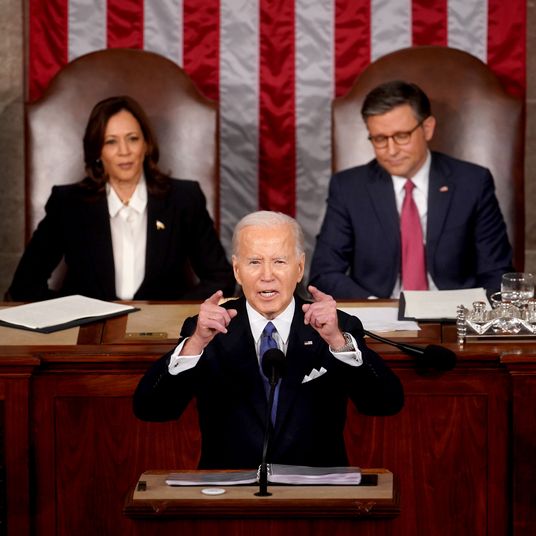In the complex chess game of presidential campaigns seeking an Electoral College majority, the obvious starting point is the last presidential election. That’s particularly true this year with Joe Biden and Donald Trump set for a rematch. In a number of battleground states Biden won in 2020, he’s now trailing in recent head-to-head or multicandidate polls. Two of these states stand out: Nevada, where Trump is leading by 7.7 percent in the RealClearPolitics polling averages, and Georgia, where Trump’s lead is 6.2 percent.
Georgia worries Democrats more than Nevada does because it has 16 electoral votes compared to the Silver State’s six. Additionally, while there has been a Republican mini-trend in Nevada, the state hasn’t been won by any GOP presidential candidates since George W. Bush. Georgia’s extremely narrow Biden margin in 2020 was the first Democratic presidential win there since 1992.
As the New York Times reports, some influential Democrats trying to build a map with 270 electoral votes are substituting another southern state for Georgia in their 2024 plans: North Carolina, which also has 16 electoral votes. Yes, Trump has carried the Tar Heel State twice, but there is one solid reason it might be more promising for Biden in 2024 than Georgia: It has a downballot election that could galvanize Democrats and disadvantage Republicans. Per the Times:
[North Carolina] Republicans recently nominated a candidate for governor with a well-documented history of antisemitic comments, staunch opposition to abortion and anti-L.G.B.T.Q. views, and Democrats hope he will drag down the Republican ticket to Mr. Biden’s advantage.
Georgia now appears a little less enticing, despite a narrow Biden victory there in 2020 that gave Democrats new ambitions of winning in the South. That year, Mr. Biden ran alongside two Democratic candidates for Senate with control of the chamber at stake, prompting both die-hard Democrats and infrequent voters to surge to the polls. This year, there is no marquee down-ballot race to help Mr. Biden, and liberal organizers in the state have warned of money problems and lagging grass-roots energy.
Republican lieutenant governor Mark Robinson will face Democratic state attorney general Josh Stein in what is sure to be an expensive and incendiary gubernatorial race in North Carolina, a place where the two parties have been battling for control of state government for most of this century. Robinson’s mega-MAGA reputation and MTG-like record of outlandish comments could contaminate the statewide GOP brand and create the unusual spectacle of Trump being overshadowed by a ticket-mate, the Times notes:
Among other things, Mr. Robinson has quoted Hitler on Facebook, flirted with Holocaust denial and referred to “transgenderism” and “homosexuality” as “filth.” He has also expressed support for a six-week abortion ban, a stance Democrats have already seized on.
Pat Dennis, the president of American Bridge 21st Century, a liberal group that digs into the histories of Republican candidates, said Mr. Robinson was a “dream” for opposition researchers, adding that candidates like him who hold right-wing views on abortion “really help define the race in the suburbs, which I think is where North Carolina will be won or lost.”
Meanwhile, there are no Senate or gubernatorial races in Georgia, and state government is firmly in Republican hands.
Yes, North Carolina has most recently trended Republican in presidential races and Georgia lurched Democratic in 2020. But in 2008 (when Barack Obama carried the state), 2012, and 2016, the GOP margin in North Carolina was smaller than in Georgia, and the difference in 2020 was minimal (1.5 percent).
In 2020, Biden benefited from a coordinated campaign in Georgia led by two Senate candidates (Raphael Warnock and Jon Ossoff) who were both exceptionally good at building a voter-mobilization operation and who were able to exploit a unique situation. They both won a general-election runoff in which Republican voters were discouraged and divided by Trump’s constant assertions that the presidential vote had been “rigged” by Georgia’s Republican election administrators. So the state’s new blue hue may have been ephemeral, an impression strengthened by Georgia governor Brian Kemp’s big win in his 2022 rematch with Democratic superstar Stacey Abrams. (Yes, Warnock won another Senate race in 2022, but his Republican opponent, Herschel Walker, turned out to have some exceptional weaknesses.)
Team Biden has by no means decisively tilted toward North Carolina as its principal source of southern comfort in 2024. As the Times story notes, it has spent more on TV in Georgia so far but has placed more staff in North Carolina. There is, moreover, a path, albeit very narrow, to 270 electoral votes for Biden that includes neither Georgia nor North Carolina nor their Sun Belt cousins Arizona and Nevada (Virginia is assumed to be a relatively safe Democratic state if the national race is close). But most successful presidential campaigns have multiple avenues for victory. It would open up a lot more possibilities for Biden if Democrats can keep their fragile recent gains in the South alive.
More on politics
- The Donald Trump–Elon Musk Feud: A Complete History
- NYPD Used Stun Gun on Migrant Holding His 1-Year-Old Son
- Anti-Abortion Activists Have Republicans in a Vise

























